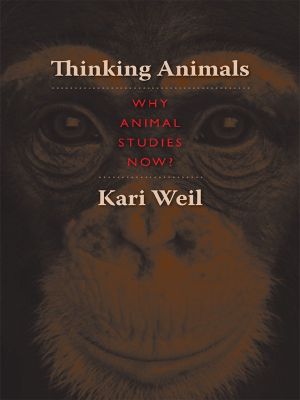Thinking Animals

- Authors
- Weil, Kari
- Publisher
- Columbia University Press
- Tags
- nature , animal rights , nat039000 , literary criticism , semiotics & theory , lit000000
- ISBN
- 9780231519847
- Date
- 2012-05-01T00:00:00+00:00
- Size
- 16.37 MB
- Lang
- en
Animal studies has emerged as a major field within the humanities, despite its challenge to the very notion of the "human" that shapes humanities scholarship. Kari Weil investigates the rise of animal studies and its singular reading of literature and philosophy through the lens of human-animal relations and difference, providing not only a critical introduction to the field but also an appreciation of its thrilling acts of destabilization.Weil explores the mechanisms we use to build knowledge of other animals, to understand ourselves in relation to other animals, and to represent animals in literature, philosophy, theory, art, and cultural practice. Examining real and imagined confrontations between human and nonhuman animals, she charts the presumed lines of difference between human beings and other species and the personal, ethical, and political implications of those boundaries. Her considerations recast the work of such authors as Kafka, Mann, Woolf, and Coetzee, and...
Animal studies has emerged as a major field within the humanities, despite its challenge to the very notion of the "human" that shapes humanities scholarship. Kari Weil investigates the rise of animal studies and its singular reading of literature and philosophy through the lens of human-animal relations and difference, providing not only a critical introduction to the field but also an appreciation of its thrilling acts of destabilization.
Weil explores the mechanisms we use to build knowledge of other animals, to understand ourselves in relation to other animals, and to represent animals in literature, philosophy, theory, art, and cultural practice. Examining real and imagined confrontations between human and nonhuman animals, she charts the presumed lines of difference between human beings and other species and the personal, ethical, and political implications of those boundaries. Her considerations recast the work of such authors as Kafka, Mann, Woolf, and Coetzee, and such philosophers as Nietzsche, Heidegger, Derrida, Deleuze, Agamben, Cixous, and Hearne, while incorporating the aesthetic perspectives of such visual artists as Bill Viola, Frank Noelker, and Sam Taylor-Wood and the "visual thinking" of the autistic animal scientist Temple Grandin. Weil addresses theories of pet keeping and domestication; the importance of animal agency; the intersection of animal studies, disability studies, and ethics; and the role of gender, shame, love, and grief in shaping our attitudes toward animals. Exposing humanism's conception of the human as a biased illusion, and embracing posthumanism's acceptance of human and animal entanglement, Weil unseats the comfortable assumptions of humanist thought and its species-specific distinctions.